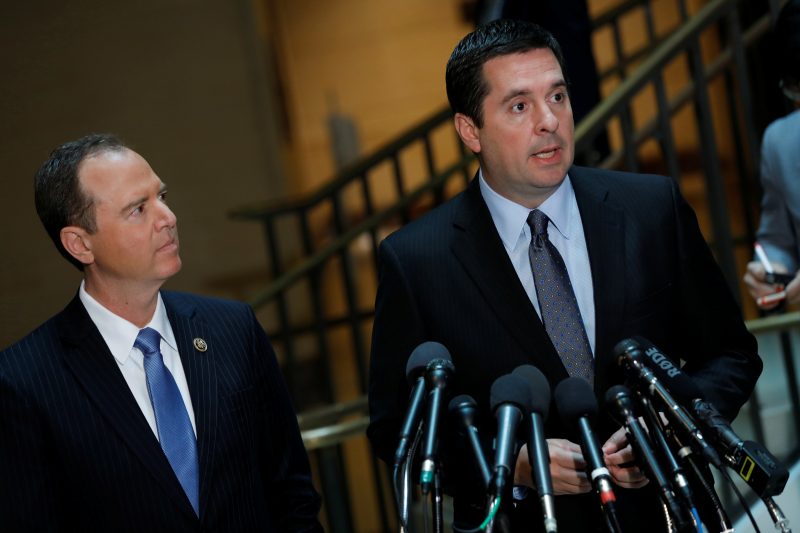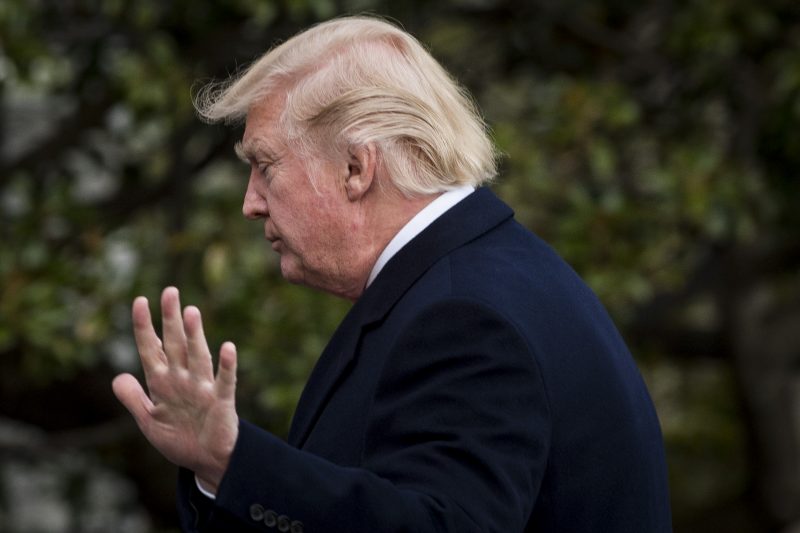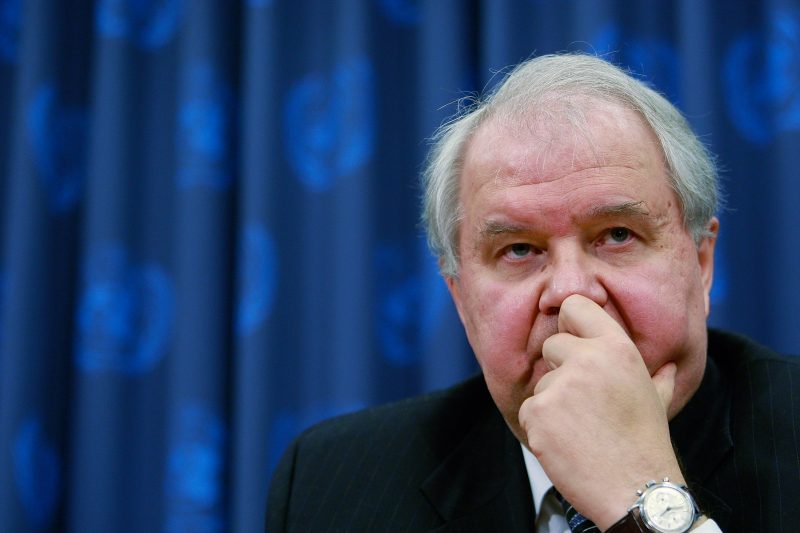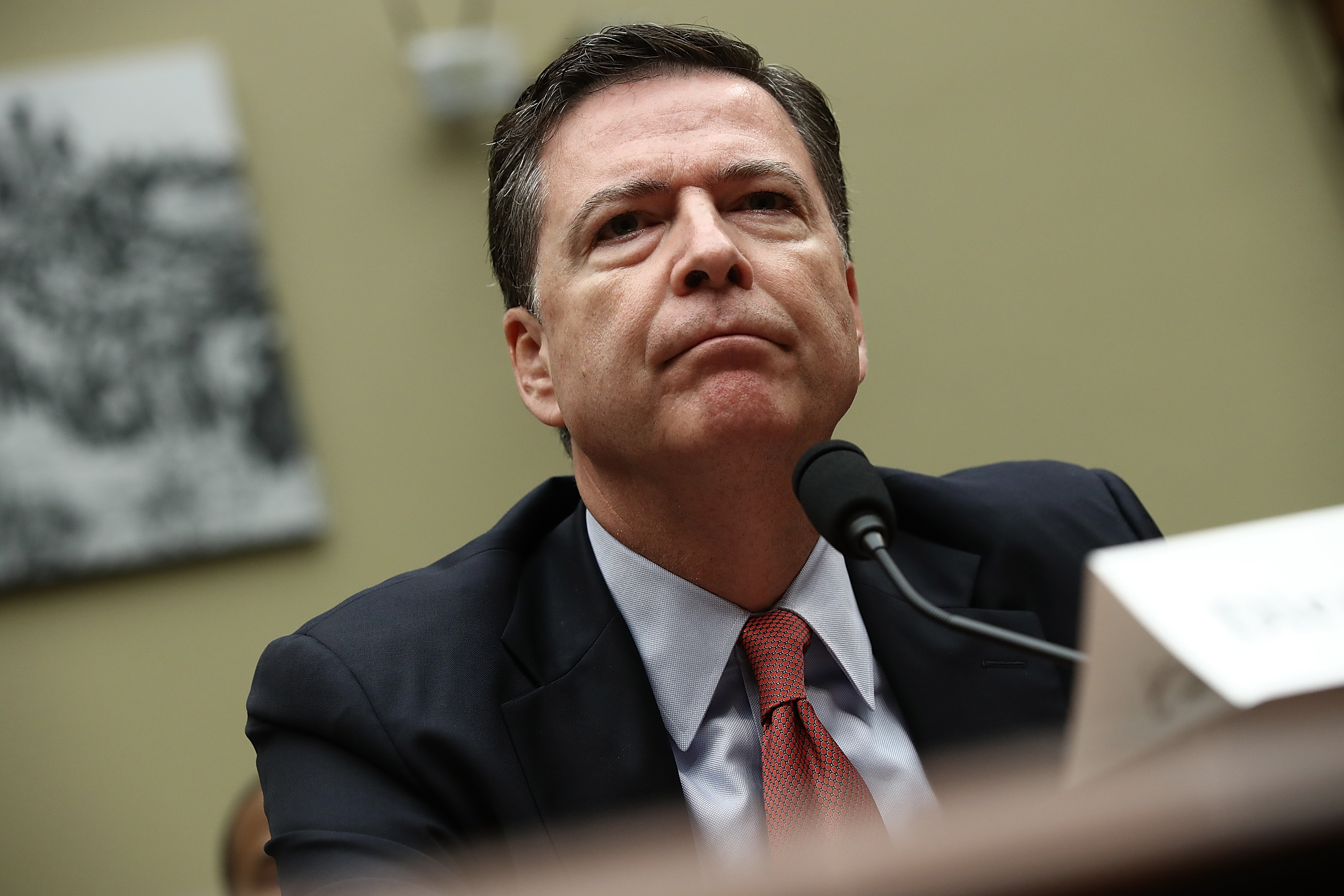- FBI Director James Comey confirmed that an investigation into Russia’s election-related meddling includes an examination of contacts between Trump associates and Russia during the campaign. The investigation was opened in July 2016, but due to “sensitivities” the FBI could not inform Congress until now. Comey said there was “no evidence” to support Trump’s claims that he was wiretapped by President Obama.
FBI Director James Comey and National Security Agency Director Mike Rogers, in extraordinary testimony before the House Intelligence Committee on Monday, confirmed an investigation into President Trump’s ties to Russia and disputed his explosive claims of wiretapping from his predecessor.
The hearing was the first time either Comey or Rogers has testified publicly since Trump was inaugurated. It came just over two weeks after Trump tweeted, without presenting evidence, that Obama had Trump Tower’s “wires tapped” during the presidential campaign.
Comey said in his opening statement that “our practice is not to confirm the existence of ongoing investigations … but, in unusual circumstances, where it lies in the public interest, it may be necessary to do so.”
“I have been authorized by the Department of Justice to confirm that the FBI is investigating Russia’s interference in the US election,” Comey added, which “includes whether there was any coordination between the campaign and Russian efforts. This will also include an assessment of whether any crimes were committed. I can not say more about whose conduct we are investigating.”
He added that the leak of classified intelligence "simply cannot be tolerated."
Both the chairman of the House Intelligence Committee, Rep. Devin Nunes, and the committee's top Democrat, Rep. Adam Schiff, have said that the committee had not found any evidence to support Trump's claim that Obama had Trump Tower phones "tapped" before the 2016 election.
But in an example of their seemingly divergent priorities, Nunes and other Republicans focused much of their attention on Monday on grilling Comey about leaks from within the intelligence community to the press.
"I hope you find those guys and I hope you crack them on the head," Republican Rep. Chris Stewart told Comey.
At one point, Nunes asked Comey whether he thought it was possible that the Russians had colluded with the Clinton campaign, too, and asked if he would take evidence of such collusion seriously if it surfaced.
Comey said he could not comment on hypotheticals but said he would take any evidence seriously.

Schiff and other Democrats, meanwhile, focused their questions on whether the FBI had evidence of collusion between the Trump campaign and Russia.
When asked whether he could confirm that Trump associates ever contacted Russian officials, Comey said he couldn't comment. He also declined to comment on whether any current administration officials are currently under FBI investigation, and said he could not comment on whether the intelligence community had found any evidence of direct collusion between the Trump campaign and Russia.
"All I can tell you is what we're investigating, which includes an investigation into whether there was coordination between the Trump campaign and the Russians," Comey said, adding that there was "no way to give a timetable" for when the investigation would conclude.
The FBI opened its investigation in late July, after WikiLeaks started publishing emails that had been stolen from the Democratic National Committee. Congress was not informed until now, due to "sensitivities," about the investigation involving Trump's contacts with Russia, Comey said.
He added noted that by December, the intelligence community became confident that Russia engaged in a "multifaceted campaign" that involved "active measures" to "hurt" Democratic nominee Hillary Clinton and "help" Trump.
"It was a fairly easy judgment for the community," Comey said. "Putin hated Secretary Clinton so much that he had a clear preference to the person running against her."
"Do Russians historically prefer Republicans to Democrats?" Nunes asked Comey and Rogers. Both appeared confused and replied that they had not assessed the Russians' preferences in past elections.

Comey confirmed later that the FBI hadwarned the DNC in August 2015that an attempt had been made to infiltrate DNC computer servers, but that the bureau had not been given access to the servers to investigate the hack further.
Comey appeared to regret not pushing the DNC harder to let the FBI investigate the hacks.
"I might have walked over there myself, knowing what I know now," he said.
When asked about Trump's claim on Monday, via Twitter, that Comey had said the Russian inteference did not influence the electoral process, Comey replied that "we have no information" about "the potential impact" the Russian interference had on the presidential election.
"That is not something that we assessed," Comey said. He confirmed that while the FBI "saw no indication" that the Russians attempted to hack into voting systems, there were Russian efforts to penetrate voter registration rolls. He also confirmed that the Russians hacked both Democrats and Republicans, but didn't release any of the stolen GOP information.
"Absent some change, this behavior is not likely to stop," Rogers said. "This won't be the last time we have these discussions."
'We don't have any information that supports those tweets'
Comey suggested during the hearing that there was no evidence supporting Trump's claim that Obama had wiretapped him.
"No individual can direct electronic surveillance of anyone," Comey said, adding that "no president could" unilaterally order a wiretap of anyone.
"We don't have any evidence or information that supports those tweets," he said.
Law-enforcement and intelligence agencies wishing to monitor signal intelligence they deem relevant to an investigation - in this case, suspected Russian interference in the 2016 election - must obtain what is known as a FISA warrant from the Foreign Intelligence Surveillance Court.
Rep. Trey Gowdy, a Republican, asked Comey whether he thought such warrants were"critical to our national security," to which Comey replied affirmatively. Gowdy asked if the "unauthorized dissemination" of information about the existence of a FISA warrant was a felony. Comey replied that it was.
"Has the investigation into the leak of classified information begun yet?" Gowdy asked Comey. Comey declined to comment, citing concerns about confirming or denying whether such classified information exists.
It had been unclear whether such a warrant was ever granted to surveil foreign actors operating inside the US that might have been communicating with Trump aides. But Comey hinted Monday that the warrant may have been granted, noting in the hearing that the FBI is "obsessive" about maintaining protocol when it comes to FISA warrants, and "an unauthorized disclosure of a FISA is an extraordinary event."
"We are taking it very seriously," Comey added.
Rogers, of the NSA, was pressed about the criteria needed to obtain a FISA warrant, and what happens when US persons are caught up in legal surveillance of foreigners on US soil.
"In broad terms," Rogers replied, when collective information via surveillance, the NSA assesses whether there is "criminal activity" or an imminent threat - if there is no intelligence value, then the information is discarded.
Rogers was asked if the FBI is required to cease collecting incidental communications obtained through lawful surveillance if the US persons caught up in those incidental communications were part of an incoming administration. Rogers replied that the NSA was "not automatically required" to do so.
Trump's explosive claims of wiretapping caused an international row last week when press secretary Sean Spicer read from unverified reports that said a British intelligence agency, the Government Communications Headquarters, or GCHQ, conspired with Obama to wiretap Trump.
The comment prompted a near-immediate reaction from GCHQ, which released a rare public statement categorically denying any involvement and calling the accusation "utterly ridiculous."
Rogers, of the NSA, denied ever asking the GCHQ for help in this kind of surveillance. He said on Monday that while the international upset is "something we'll be able to deal with," the accusation "clearly frustrates a key ally of ours."

Flynn, Kislyak, and the Trump-Russia dossier
Reports have suggested that communications between Trump's former national-security adviser, Michael Flynn, and Russia's ambassador to the US, Sergey Kislyak, were picked up by US intelligence officials who had been eavesdropping on Kislyak - not on Flynn. Current and former US officials have also told several media outlets that they have intercepted communications between associates of Trump and Russian officials.
Comey confirmed during the hearing that he views communications between US persons and Russia differently from communications between US persons and other countries because Russia "is a foreign adversary."
The House Intelligence Committee has asked the FBI, the CIA, and the NSA to give them a full list of people whose conversations may have been picked up in that kind of incidental surveillance. So far, only the NSA has "partially" complied, according to The Washington Post. Neither Comey nor Rogers would comment during the hearing on the specific people who may or may not have been caught up in the intelligence community's routine surveillance.
In a lengthy opening statement, Schiff invoked the explosive but unverified dossier written last year by former British spy, Christopher Steele, detailing the Trump campaign's alleged communication with Russian nationals and officials during the campaign.
Kislyak and Flynn - along with Trump's former campaign manager, Paul Manafort, and an early foreign-policy adviser, Carter Page - were all named in the dossier as complicit in the Russian meddling.
Rep. Joaquin Castro, a Democrat, also invoked the dossier, asking whether it was plausible that the Russians "might seek out Americans" to help with their intelligence-gathering operations.
Comey confirmed that it was a "core part" of the Russians' intelligence methods to "try and recruit Americans." Castro asked if Manafort was one of the subjects of the FBI's investigation, but Comey declined to comment.
The dossier was published in full by BuzzFeed in late January after CNN reported that Comey and other top US intelligence officials had briefed Trump and President Obama on its contents.
Rep. Pete King, a Republican, asked Comey if it was illegal that the fact that those briefings occurred was leaked to the media.
Comey said he could only comment on the fact that leaking classified information is a very serious matter.
"Often, it doesn't come from people who know the secrets. ... It is an enormous problem, though, whenever you find information that is actually classified in the meeting. We don't comment on it because we don't want to confirm it," he said.
Flynn was forced to resign in early February after reports surfaced, based on conversations that were reportedly intercepted during routine surveillance of Russian ambassador Sergey Kislyak, that Flynn had discussed US sanctions on Russia with Kislyak in December. Comey refused to comment on why he thought Flynn had spoken with Kislyak, and what the FBI knew about their phone calls.
Comey was asked if he was aware Flynn "ever communicated to the Russian government that the Trump administration in the future" would rescind US sanctions on Russia. Comey replied that he couldn't comment because he didn't want to talk about anything relating to a US person that may be under investigation.

